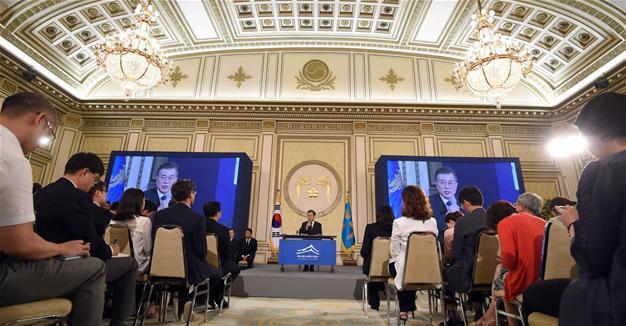S. Korea's Moon: There will be no war on Korean peninsula
SEOUL
 There will be no war on the Korean peninsula, South Korean President Moon Jae-In said on Aug. 17, saying Seoul effectively had a veto over the United States military action in response to the North's nuclear and missile programmes.
There will be no war on the Korean peninsula, South Korean President Moon Jae-In said on Aug. 17, saying Seoul effectively had a veto over the United States military action in response to the North's nuclear and missile programmes.Tensions have soared on the peninsula in recent months, with Pyongyang carrying out its first successful tests of an intercontinental ballistic missile (ICBM), bringing much of the U.S. within range.
Last week it threatened to send a salvo of rockets towards the U.S. territory of Guam -- although it appears to have backed off for now -- while U.S. President Donald Trump promised "fire and fury" and said that Washington's weapons were "locked and loaded.”
The intense rhetoric on both sides has raised fears of a miscalculation leading to catastrophic consequences -- Pyongyang has vast artillery forces deployed within range of Seoul, where millions of people live.
But Moon said: "I will prevent war at all cost.”
"I want all South Koreans to believe with confidence that there will be no war," he told a press conference marking his first 100 days in office.
The U.S. has been the South's security guarantor since the end of the Korean War in 1953, which left the peninsula divided and technically still in a state of conflict with no peace treaty signed.
Washington has 28,500 troops stationed in the country to protect it from the North.
But Moon said Seoul effectively had a veto on military action by the U.S.
Washington and Trump had agreed that "no matter what option they take about North Korea, all decisions will be made after consulting with and getting agreement with the Republic of Korea."
Trump's rhetoric has raised alarm among observers but Moon, who visited Washington at the end of June, declined to criticise his choice of words.
The U.S. leader was "trying to pressure North Korea by showing a firm resolution", he said.
Pyongyang says it needs nuclear weapons to defend itself from possible invasion by its "imperialist enemy" the U.S. and has long sought to develop a nuclear-tipped missile capable of hitting the U.S. mainland.
In the past Moon, a left-leaning former human rights lawyer, has urged engagement with Pyongyang to bring it to the negotiating table, in addition to sanctions. But since coming to power his gestures have been rebuffed by Pyongyang, and he played down the urgency of dialogue.
The North's leader Kim Jong-Un said Aug. 15 he would "watch a little more" before making a decision on the Guam missile launch, a declaration Trump lauded as "very wise".
Meanwhile, General Joe Dunford, the chairman of the U.S. joint chiefs of staff, said on Aug. 17 that peace with North Korea is a “possibility,” adding that the U.S. has “credible, viable military options” for dealing with the issue.
He also told reporters during his visit to Beijing that the U.S. has no plans to “dial back” military exercises with South Korea, which have angered both China and North Korea.
“What’s unimaginable to me is not a military option,” Dunford said.
“I do believe right now that there’s a long way to go, but we are on a path where there is a possibility -- and I hope a probability that we can resolve this peacefully,” he added.
In addition, U.S. Vice President Mike Pence on Aug. 16 called on Brazil, Mexico and other Latin American powers to break off economic and diplomatic ties with North Korea over Pyongyang’s missile threats.
“We strongly urge Chile today and we urge Brazil and Mexico and Peru to break all diplomatic and commercial ties to North Korea,” Pence told a press conference alongside Chilean President Michelle Bachelet.
Chile’s Foreign Minister Heraldo Munoz later responded: “We respect the United States’ request, but Chile will maintain its relations. They are distant relations because we have strictly applied all the sanctions decreed by the (UN) Security Council” against North Korea.
















